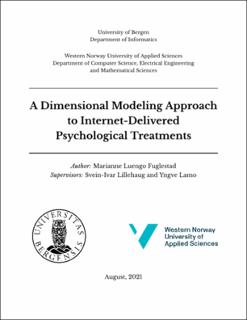A Dimensional Modeling Approach to Internet-Delivered Psychological Treatments
Master thesis

View/
Date
2021-08-02Metadata
Show full item recordCollections
- Master theses [197]
Abstract
Mental health problems are becoming an increasingly significant public health concern on a global scale. While effective psychological treatments exist, they scale poorly to the number of people who require help, meaning many continue to suffer due to a lack of care. Internet-Delivered Psychological Treatments (IDPT) have emerged as an innovative alternative to traditional treatments that aims to be more scalable, cost-effective, and accessible. Although the use of IDPT has yielded promising results, it is also associated with a number of challenges. One challenge is preventing patient dropout, leading to an interest in adaptive IDPT that focuses on personalizing the treatment based on user needs. Furthermore, IDPT systems may generate large amounts of complex user data that must be structured sensibly in order to facilitate data analysis. In this thesis, we demonstrate a dimensional modeling approach to organizing the components of IDPT. We focus on two use cases for this approach, namely (1) facilitating reuse of treatment materials and (2) adapting treatment to user needs. Using the design science methodology, we have developed a dimensional model for IDPT as our artifact. In addition, we discuss the implementation of the dimensional modeling approach in IDPT systems and related challenges. The artifact was primarily evaluated through a semi-structured interview with domain experts of psychology. Based on this, we found that the artifact represents a suitable starting point for future research within this topic.